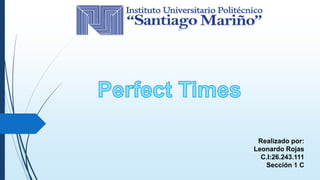
Tiempo perfecto
- 2. Se usa el presente perfecto para acciones que ocurrieron en un tiempo no concreto antes de ahora. El tiempo específico no es importante. Por lo tanto, no solemos usar expresiones de tiempo específicas con el presente perfecto. Se puede usar el presente perfecto con expresiones de tiempo no concretas. Perfect Times Sujeto Verbo auxiliar Forma Corta Participio Pasado I, you, we, they have I’ve, you’ve, we’ve, they’ve talked, learned, traveled… he, she, it has he’s, she’s, it’s talked, learned, traveled…
- 3. Auxiliar to Have Para formar el presente perfecto, se usa el verbo auxiliar “to have” en el presente y el participio pasado del verbo. Para verbos regulares, el participio pasado es la forma simple del pasado.El verbo 'to have' tiene como significado principal de 'tener' y 'haber'. Puede tener también otros significados, como 'tomar'; dependiendo del sentido de la frase. Ejemplo: 1. I have a new car (Tengo un coche Nuevo) 2. have worked (He trabajado) 3. I have coffee (Tomo café) INFINITIVO PRETERITO PARTICIPIO to have haber, tener had hube, había, tuve, tenía had habido, tenido
- 4. El verbo Have se utiliza como principal y significa “Tener”. FORMA AFIRMATIVA FORMA NEGATIVA FORMA INTERROGATIVA I have (I've) I have not (I haven't) have I? he, tengo no he, no tengo ¿he?, ¿hengo? you have (you've) you have not (you haven't) have you? has, tienes no has, no tienes ¿has?, ¿tienes? he has (he's) he has not (he hasn't) has he? ha, tiene no ha, no tiene ¿ha?, ¿tiene? we have (we've) we have not (we haven't) have we? hemos, tenemos no hemos, no tenemos ¿hemos?, ¿tenemos? you have (you've) you have not (you haven't) have you? habéis, tenéis no nabéis, no tenéis ¿habéis?, ¿tenéis? they have (they've) they have not (they haven't) have they? han, tienen no han, no tienen ¿han?, ¿tienen?
- 5. Have como auxiliar Sirve para formar los tiempos compuestos cuando acompaña al participio de los verbos. Por ejemplo: *have played (He jugado) *I had played (Había jugado) Estructuras: *Afirmativas: Sujeto+ HAVE/HAS/HAD + p.p.del verbo+ complemento *Negativas: Sujeto+ HAVE/HAS/HAD + Not + p.p. del verbo+ complemento *Preguntas: HAVE/HAS/HAD + Sujeto+ participio pasado (p.p.) del verbo+ complemento? WH+ HAVE/HAS/HAD + Sujeto+ p.p del verbo+ complemento? Have Como auxiliar
- 6. Ejemplos Afirmación 1. I have bought a new dress.(Yo he comprado un nuevo vestido) 2. You have studied the lesson.(Tú has estudiado la lección) 3. He has broken the window. (Él ha roto la ventana) Negación 1. I have not bought a new dress.(Yo no he comprado un nuevo vestido) 2. You have not studied the lesson. (Tú no has estudiado la lección) 3. He has not broken the window. (Él no ha roto la ventana) Interrogativa 1. Have I bought a new book?(He comprado un nuevo libro?) 2. Have you studied the lesson?(Has estudiado la lección?) 3. Has he broken the window?(Ha roto él la ventana?)